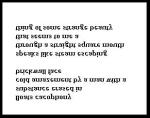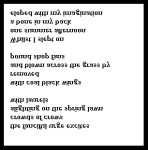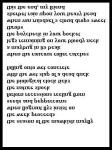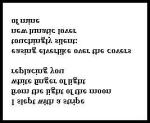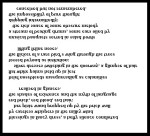[published in August 2006 I have no recollection of either commissioning or editing this article. As it mentions several writers who appear elsewhere in this journal – Fjona Uu, F L C Gorngy and Yoy Ijit – I thought it would, however, bear re-printing]
Grandma met me at the garden gate, thrusting the house key into my hand and shooting me a smile pitched somewhere in-between love and pity. She pushed past me without a word and trotted down the path, her false hip clicking as she went. On her shoulders she carried a rucksack containing enough clothes to last a week. It must have been heavy, but it didn’t weigh her down. Formally feeble as a fly, she was powered as if by turbo jet by her determination to reach the train station as fast as possible; by her single-minded desire to flee the town before the first of them arrived. In the time of Moses, the elderly moved with similar speed at the sight of a swarm of pestilent locusts. However, it was not the threat of insects, but of festival-goers, that provided so much extra gas in Grandma’s legs.
She needn’t have moved so fast. In only its first year, the Sträunhoe Arts Festival has yet to establish itself as a recognised crowd-puller. In fact, it may well be the first ever festival in which the events have numbered more than the visitors. Sträunhoe may be a small town, but to call the festival an invasion (as Grandma had done) was always going to be serious exaggeration of the truth. There were four times more visitors only a week before at the occasion of the mayor’s daughter’s marriage. The difference in the town was barely discernible, except for the marquee in the central square, which gave only the appearance of something happening, for in reality it was almost always empty. If any disruption was caused, it was kept at a minimum. Certainly it was not enough to bother the locals, whose narrow streets remained no more crowded than a suburbian second hand book store.
So what was it that had frightened Grandma off? Maybe it was not so much the fear of a lot of people so much as a particular type of person. She was not escaping from festival-goers as such, but ‘The Festival Goer’ – the singular breed which, in groups of twenty or of two hundred, represents as much a threat as it does in a group of two. What do I mean by ‘The Festival Goer’? Well, having just returned from a festival myself, I guess that I mean people like me. Grandma fears – or else simply dislikes – people like me. Well, that would explain the expression with which I was greeted, not to mention her not infrequent disparaging references to ‘your son’s artistic fancies’ in the letters she writes in letters to my mother. I always knew it. She has always had this unaccountable phobia of artists, ever since my grandfather left her after forty years of marriage to try his luck as a street painter in Paris. She prides herself in being a working woman. The artistic sort are, by implication, slothful nonentities. And festival-goers are one step worse. They afford artists an audience. They facilitate futility. They give idiots the impression that what they are doing might actually have some importance. Woe to them.
But who am I to complain? She let me her house for a week, free of charge. She even stocked the fridge for me, though I can’t say I’m overly fond of asparagus quiche or carrot juice. Nevertheless, I’ll give Grandma her due. If an Arts Festival isn’t her thing then so be it. I can almost see where she is coming from. Sträunhoe isn’t for everybody. It’s barely for anybody. In fact, its target audience is probably smaller than that of the academic companion to the reader’s companion to the general companion to James Joyce’s Finnegan’s Wake. But that doesn’t mean that it’s entirely worthless. By no means. For all that it lacked in accessibility, consistency and popularity, this year’s Sträunhoe Festival proved itself more than a commendable addition to the European Arts Calendar. Mixing innovative approaches to old drama, interviews with the best contemporary European novelists, 18th century German paintings, rare performances of avant-garde music and, wait for it, cultural historical stand-up comedy – I would be being deceitful were I to imply that the organisers hadn’t put on an attractive show. There isn’t another small town in Austria that could offer as many arts events in the first week of August at such a reasonable price. And to prove that I’m not just saying this to placate all those friends of mine on the committee (yes, I’m thinking of you, Mr. Klavnich) I intend forthwith to unfurl the wings of this ephemeral accolade and present you with what should amount to relatively well-feathered résumé of my Sträunhoe experience.
I may as well start with the cultural historical stand-up comedy, if not because it deserves immediate attention, than at least because it sounds as if it does. In reality, of course, it turned out to run of the mill stuff: an elderly University professor from Oxford, England, trying to raise laughs from his late career as a historian, whilst promoting his new career as a comedian. One suspects that the old man has lost his mind, but one mustn’t begrudge him this (for god knows that hasn’t stopped a lot of great artists in the past). Whether or not Sträunhoe was quite the place for him to make his debut I wouldn’t like to say; sufficed to say that, like me, he has friends amongst the organising committee. As it was, he was the only comedian at the festival. Or should I say ‘comedian’? Wait, no: allow me to retrieve that comment. Professor A P T Watson wasn’t unfunny as such, merely a little hit and miss. Part of the problem lay with the fact that few of the audience, which numbered about a dozen, could either speak enough English to understand him, or knew enough English history to understand the references. Falling into the latter camp, I must profess to my utter confusion at certain junctures when my ignorance of the subject demanded that I could not find its treatment amusing. I did, however, enjoy the joke about Henry VIII downloading dirty pictures of Anne of Cleves from the internet – less so the series of somewhat misjudged gags which followed on the subject of female genius (‘No, but seriously’), which at times might be said to have bordered on the chauvinistic. Not what I would have expected from an elderly English historian. Despite this, I don’t think that Sträunhoe should give up on the idea of allowing comedians a space in this mostly dry literary arena. I’ve heard that there’s an amusing Ukrainian comic going around who does great jokes about the state of Bulgarian poetry – maybe they should book him for next year.
Either that or we shall be forced to find our comedy elsewhere. Maybe even in places where it ought not to be. Laughs lurking in foreign lairs, as they say. The risk of raising laughter is run only by the only truly brave. And without risk, an Arts festival has nothing to celebrate. Therefore, laughter lurks – not only in comedy (if indeed it does lurk there) but everywhere else too. In drama, for instance. Drama that leans like the aged lamppost towards the tragic. And since we’re talking of tragedies, I may as well reveal to you the nature of the play which I saw performed at the festival last week. It was Hamlet, the twisted Englishman’s finest, translated once, and then translated again, more playfully. A student production, if you must know, performed backwards. In diving suits. Nothing else to it really. They followed the traditional line when it came to scenery, characterisation and editing. There were just those two small changes: reading the text backwards and wearing diving suits throughout. As I said: nothing to it.
One may have begun to understand my comment regarding the skulking snake that is laughter on a foreign stage. But you are mistaken, thankfully. The conceit seems comical in retrospect, but in actual fact I can assure you that they pulled through without raising so much as a giggle. I should know. I was one of only two in the audience – and the other man slept throughout. And If he chuckled in his sleep, I credit the expression to the drama of his dreams – not that which took part on the stage. For my part, I was at first caught between being impressed and exhausted. Having thought the diving suits to be no more than a quaint and naïve reference to Salvador Dali, I gradually came to the realisation that they were instead an apt and exciting metaphor for the human condition. The inevitable conclusion to the maelstrom of such eternally uncommunicative behaviour was then underlined by their performing the play backwards. By no means a poor concept, I thought. Nevertheless, I did not think it necessary to sit through the whole thing. Once you’ve got the idea, you’ve got the idea. Or maybe not. At least, the performers begged to differ; my attempts to escape the makeshift theatre at the interval thwarted when I was captured with a huge fishing net trying to sneak out of a back entrance. I enjoyed the rest of the show hand-cuffed to a front row seat. What can I say? It seems that the Georgy Riecke Ethos of Entertainment is very much alive amongst young drama students. And good for them. I can’t say that I didn’t appreciate having to sit through the entire performance after all. My only regret is that I too was not given a diving suit.
Protective clothing might also have been useful during the rare performance of Alexander Lem’s First Piano Concerto that took place the following afternoon, with the composer himself at the piano. As you will probably know, though music critics frequently trumpet the profound qualities of Lem’s music at vociferous volume, few if any of his works are regularly performed. This is principally for financial reasons – as this performance ably demonstrated. Not only did Lem demand a stratospheric fee for his appearance, but the piece asked for a high quality grand piano to be destroyed over its course. Though Alexander Lem may use the same instruments as any other composer, he has always declined to use them in the same way. In this particular example he did not use his hands to manipulate the piano keys, but two heavy headed hammers. Therefore if one was unfortunate to be in the front row (as a lot of people were, this being one of the festival’s better attended events) one had to deal with splinters of wood flying in one’s face. On the other hand, one was also in a very good position to hear what was undoubtedly one of the greatest musical performances I have ever heard. For all its hammer action, Lem’s First Piano Concerto is actually a rather delicate work; the plaintive melodies that haunt all three movements mirroring the gradual disintegration of the instrument on which they are played. At the end of the final movement, when there are no notes left to play, the pianist is forced to knock the final melody on the last remaining piano leg. This is one of the great moments in modern music: sound at its most minimal, and also at its most effective.
A good festival can remind one of the immediate power of performance. At the same time, one is also reminded of how difficult it sometimes is for live events to compete with those in which we take part in alone, accompanied only by our imaginations. It is here that we consider the difficulties with which writers are presented on those occasions on which they are expected to leave their dusty studies and stand in front of their fans. Upon seeing the light of day, the bookworm is inclined to shrink to half its size. The writer whose prose fizzes and pops with energy is not guaranteed to serve up as many thrills as a public speaker. Too often has my enthusiasm for a writer been dampened upon meeting them. And yet I can’t help myself. I still want to see them; to glimpse them, like a naturalist creeping behind a bush to get a better look at an elephant, even though they already know what they look like. And I am not alone. Not alone in constantly wanting to meet writers – and not alone in always being disappointed in what I find.
Too small to be attracting a swarm of scribblers, Sträunhoe nonetheless managed to attract a fair number of enterprising writers to its first book festival. Chief among them was Fjona Uu, who received much praise a few years back for her witty and enlightening debut novel Lava in a Cold Climate. On this occasion she was, however, more keen to talk about her second novel – Pincers in the Tower – which will be published shortly. It is, as she explained, a crabby satire of historical novels. It is just as well she said this, for otherwise I wouldn’t have guessed, it appearing to be one of those satires which have been so carefully researched that it would take only the closest reading to reveal the author’s subtly wrought intentions. In fact, I am tempted to wonder whether or not it is less satire on a historical novel than a historical novel which didn’t quite work and was thus rescued with a silly title and re-branded as a clever satire. But don’t mind me – I don’t doubt that all the really intelligent critics will agree with the author over this one. And thankyou Fjona Uu for signing my advance copy nonetheless. Especially as you were nice enough to use your real name – unlike the robustly built F L C Gorngy, who for no particular reason decided to sign nearly fifty copies of his novel Incompetence 119 with the name ‘Mickey Mouse’. Perhaps he was trying once more to prove his comedic worth, having pretty much failed miserably to raise more than a faint smile during a reading from his new political thriller cum philosophical comedy. Sadly it lacked the wit of his earlier work, excepting the moment when the author tripped up and fell off the podium – which, alas, was not intentional.
If Gorngy and Uu were the literary heavyweights, the lesser players certainly did not lack appeal. One of them in particular seemed to be generating a mountain of interest. This was Kim K Heinze, the politician’s daughter turned transvestite whose ‘work’ has been gathering rave reviews from the Dutch press. So far as I can tell, she/he hasn’t written anything yet, but the rumours are that her covering letters to as yet unwritten novels were thought to be better than most novels themselves. Quite possibly it is these that will be published. More likely she/he will simply become a fixture at every Arts festival for the next three years, and then die in a drugs-related incident with a pencil stuck up her/his nose.
Elsewhere a group of young poets joined up with Welsh based Tibetan exile Martyn Meng to discuss ‘The Future of the Avant-garde Ode’. Eva Holubk was present, as was J-P Sertin, but fellow ‘intercutter’ Pierre Monceau was sorely missed. After four hours of wordy wailing the subject was thought to have been well covered, with conclusions satisfyingly absent. Following the denouement of this discussion Georgy Riecke turned up, very briefly, to lecture an empty room about the merits of Johannes Speyer’s late literary theory. Apparently he was very good.
Meanwhile time restrictions demanded that I should be elsewhere, supping on other choice cultural cutlets. The problem with these arts festivals is that, with so much going on, it is extremely hard to fit everything in. And there are some things which you can’t afford to miss. For instance the exhibition based around the work of Ludwig van Meidheim. Not officially part of the festival, this exhibition is running in the church of a small village outside Sträunhoe, which has for some years owned an early Meidheim work. Though this one work is joined only by two more for this much-less-than-comprehensive show, I would never claim that it wasn’t worth the journey. One Meidheim painting is more than enough to sate any aesthete’s appetite. His Snow Scene at Night is, for me, one of the pinnacles of 18th German painting. Prefiguring Caspar David Friedrich’s Winter Landscape of 1811, it reveals a similarly romantic scene, complete with fir tree, a city in the mist and a single figure in the snow. However, where Friedrich’s composition is built around a small crucifix, Meidheim’s painting has as its centrepiece a small green man – thought by many to be one of the earliest detailed depictions of an extra-terrestrial in western art. Following the painting’s lead, the exhibition explores the history of the little-green-alien cliché, examining in particular its possible cultural implications, including an interesting analogy between the alien and the Irish leprechaun and their respective roles within the rising culture of twentieth century advertising. Needless to say, this is art history at its most fascinating – and well worth a visit.
I am not sure whether or not I could say the same for my last item: the last link in this eccentric artistic parade which began alongside the smelly pond of comedy, before moving through the valleys of theatre, classical music and literature, traversing the hillock of painting and arriving here, finally, in the filmic fenlands. In these respects, Sträunhoe achieved what amounts to a second coup – following the appearance of Alexander Lem – with the world premiere of Marco Geist’s Grandmother’s Pudding. Having thrilled scruffily attired film-goers across the fringe cinemas of all the major European cities with his ultra-violent and ultra-stylish film trilogy The FoodGatherer, the American based Geist has become a cult figure with shocking swiftness. However, though he has always had a reputation for unpredictability, his decision to make a film version of Paulo Zilotti’s adaptation of Yoy Ijit’s novel My Grandmother’s Pudding did come as a surprise to almost everyone; the little word ‘why’ slipping out from between most of his fans’ lips. Following its first screening, this unadorned utterance is unlikely to go away. As much as I enjoyed Zilotti’s zestful opera – which made its first appearance earlier this year – Geist’s adaptation seems pointless at best. It was due to studio pressure, apparently, that the ‘My’ was dropped from the title. The hope was of making the whole thing more ‘immediate’ and ‘accessible’. Unfortunately this delicate reshuffling has failed to have any effect on the content of the film, which happens to be neither immediate nor accessible. We shall not lose tears over the latter, perhaps, but we certainly shall over the former. Geist’s strengths as a film-maker undoubtedly lie in his ability to engage with his audience on a purely visceral, if not primeval level. In light of this, My Grandmother’s Pudding does appear to have been an inspired choice of material with which to work. Unfortunately the filmmaker’s response is riddled with curious oversights. Rather than rest on the blood stained laurels of domestic horror, which he has long since mastered, he opts instead for a lighter touch. Of this he is simply not capable. The dancing pudding scene, with its skewed homage to Prokofiev, is neither funny nor frightening, merely embarrassing – whereas the gloriously bloody ending is inexplicably watered down, thanks in no small part to the rather poor acting of the dog. As for the retro design of the fridge, I do not even wish to understand its relevance – if indeed it has any. Geist appears to be trying to apply some intelligence; but if his film is a large piece of toast, his uncertain wit is spread as thinly and sporadically as marmite in the hands of misguided toddler. All I can say is: an opportunity has been missed here, and it is, in short, a pity.
But such, in short, is the nature of an Arts Festival. This is, maybe, what Grandma fears – the sheer inconsistency of it all. The good shares a bunk with the bad, the all right a seat with the adequate. One doesn’t always know what to expect. On the other hand, unless one tries to understand the warped tangles of these artists’ minds, one can never claim to have been part of a proper audience: that is, a group of people who not only listen, but absorb and, when needs be, give the performers the benefit of the doubt. But that’s not to say that one should exercise too much kindness. By no means. There’s judgment, and there’s understanding, and there’s sympathy, and there’s prudence, and there’s fairness. But there’s also a puddle of dung in the corner of every cow field. And one oughtn’t put one’s foot into it, not unless one is wearing extremely good Wellington boots.
Adrian der Linger
